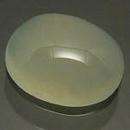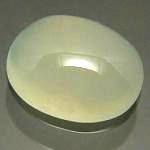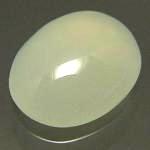|
ClassicGems.net |
|
|
 |
|
Antigorite |
|
|
Discovered in 1840; IMA status: Valid (pre-IMA; Grandfathered) |
|||
|
|
|
Chemistry |
|
|
|
|
|
(Mg;Fe2+)3Si2O5(OH)4 |
|
|
|
Magnesium Iron Silicate Hydroxide |
|
Molecular Weight: |
300.77 gm |
|
Composition: |
Magnesium |
18.18 % |
Mg |
30.15 % |
MgO |
|
|
Iron |
13.93 % |
Fe |
17.92 % |
FeO |
|
|
Silicon |
18.68 % |
Si |
39.95 % |
SiO2 |
|
|
Hydrogen |
1.34 % |
H |
11.98 % |
H2O |
|
|
Oxygen |
47.88 % |
O |
|
|
|
|
|
100.00 % |
|
100.00 % |
= TOTAL OXIDE |
|
|
|
||||
|
Classification |
|
|
|
|
|
Silicates (Germanates) |
|
|
8/H.27-10 |
|
|
|
9 : SILICATES (Germanates)
|
|
Related to: |
Serpentine Group (also known as Kaolinite-Serpentine Group). Polymorphous with Clinochrysotile, Lizardite, Orthochrysotile, and Parachrysotile. |
|
Members of Group: |
Serpentine Group (also known as Kaolinite-Serpentine Group): Amesite, Antigorite, Berthierine, Brindleyite, Caryopilite, Chrysotile, Clinochrysotile, Cronstedite, Dickite, Fraipontite, Greenalite, Halloysite, Kaolinite, Kellyite, Lizardite, Manandonite, Nacrite, Népouite, Odinite, Orthochrysotile, Parachrysotile, Pecoraite |
|
Varieties: |
Al-Antigorite, Andes Jade, Bowenite, Jenkinsite, Picrolite, Picrosmine, Vorhauserite, Webskyite, Williamsite |
|
Synonyms: |
Baltimorite, Bastard Asbestos, Genthite, Gymnite, Iron-Gymnite, Nickel-Gymnite, Porcellophite, Protoantigorite, Septeantigorite, Thermophyllite, Yu yen shi stone, Yu yen stone, Zermattite |
|
|
|
|
Crystal Data |
|
|
|
|
|
Minute crystals, typically platy along [001], rarely elongated along [010]; some plates have rectangular outline due to cleavage; commonly bladed or fibrous. |
|
|
May exhibit two- or three-fold twins rotated 60° about an axis [001]. |
|
|
|
|
|
Physical Properties |
|
|
|
|
|
Perfect on {001}, observed on {100} and {010} |
|
|
Conchoidal or Splintery |
|
|
Brittle |
|
|
3.5 - 4.0 |
|
|
2.50 - 2.60 (g/cm3) |
|
|
None |
|
|
Not Radioactive |
|
|
|
|
|
Optical Properties |
|
|
|
|
|
Green, Blue-Green, White; Colorless to pale Green in thin section. |
|
|
Translucent to Sub-Opaque |
|
|
Resinous, Greasy, Silky, Waxy, Earthy |
|
|
1.555 - 1.573 Biaxial ( - ) |
|
|
0.005 - 0.006 |
|
|
Weak; r > v |
|
|
None |
|
|
|
|
|
Occurances |
|
|
|
|
|
Geological Setting: |
Commonly replaces ultramafic rocks, pervasively or in crosscutting veinlets. As a replacement of siliceous dolostone along contacts with diabase sills. |
|
Common Associations: |
Chromite, Chrysotile, Magnetite, Olivine |
|
Common Impurities: |
Ni, Al, Mn |
|
Co-Type Localities: |
• Antigorio Valley, Ossola Valley, Verbano-Cusio-Ossola Province, Piedmont, Italy; • • Geisspfad area, Binn Valley, Wallis (Valais), Switzerland |
|
Year Discovered: |
1840 |
|
View mineral photos: |
|
|
|
|
|
More Information |
|
|
|
|
|
|
|
|
|
|
|
Antigorite is a member of the Serpentine Group of minerals that also includes Chrysotile and Lizardite. The Serpentine Group is a subgroup of the Kaolinite-Serpentine Group. Most Antigorite is opaque and fibrous but a few locations produce beautiful, translucent, pale to dark green material suitable for cabochons, carvings and rarely faceted gems. Antigorite was named in 1840 by Swiss chemist Mathias Eduard Schweizer (1818 - 1860) for the type locality, Valle di Antigorio, Domodossola, Piedmont, Italy; although there is some question whether it was found on the Italian side or the Swiss side of the border. There are a couple of gem varieties of Antigorite; Bowenite and Williamsite. Bowenite is a translucent, light to dark green, rarely blue-green, variety. Bowenite from China is translucent and light yellowish green while Bowenite from New Zealand can be dark green. Williamsite is a translucent, pale, apple green variety that often contains inclusions of dark, octahedral microcrystals of Chromite. There is also a chromian (Cr) rich variety of Antigorite. Chromian Antigorite is colored lavender to deep purple by its chromium content. It is typically opaque, massive material that makes for very attractive mineral specimens. Faceted gems are also very attractive but rare. Sources of Antigorite include the type locality; Antigorio Valley, Piedmont, Italy; New South Wales, Australia; Tirol Austria; Liaoning Province, China; Nagasaki and Fukuoka Prefectures, Japan; Glen Urquhart, Scotland; and in the USA at Texas, Pennsylvania; Baltimore, Maryland; and Brewster, New York. Most of these locations produce opaque, fibrous material not suitable for faceted gems or cabochons. |
|
|
Antigorite gems for sale:
|
|||||||||||||||||||||||||||

